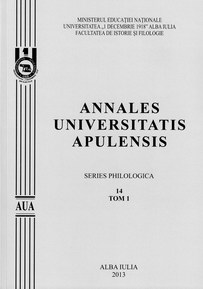Identităţi multiple în tetralogia exilului la Dumitru Ţepeneag
Multiple Identities in Dumitru Ţepeneag’s Tetralogy of Exile
Author(s): Sofia Sonia ElvireanuSubject(s): Literary Texts
Published by: Universitatea »1 Decembrie 1918« Alba Iulia
Keywords: exile; novel; identity; Dumitru Ţepeneag
Summary/Abstract: This paper intends to focus on the multiple identities of a young Romanian writer exiled in Paris that are to be found in his novels like the fictionalization of the biographical I and author’s implications in the text. The primary identity, the cultural-linguistic one fragmentizes by emphasizing on another geo-cultural space and ceaselessly reconstructs through the impact with alterity from the historical chronotope. From a linguistic point of view, it is about an bilingual identity: Romanian-French. At a fictional degree that implies a character with a ambiguous identity, depersonalized, postmodern by a immanent and identitary deconstruction and reconstraction in exile which is transposed through a narrative identity. The narrative identity, on the one hand, follows the insinuating way of the real exile and, on the other hand, it underlines the literary expressions or forms of some Romanian cultural fantasies that are generated by the loss of the primary identity and by the need of the retrieval of the identitary unity before the exile. The identity of the real writer, Dumitru Ţepeneag, modifies in exile because of the dislocation and is expressed by his pseudonyms used for his novels: Dumitru Ţepeneag became Tzepeneag and Pigeon vole is signed with the heteronym Eduard Pastenague. The narrative identity used to fictionalize his own exile is dislocated into multiple characters: the author involved in the text and the relator, the character-actor, embodied in different aspects of exiles. The identity of the Romanian exile comes across with the identities of other exiles from the same ethnic and linguistic space in order to place the reader in front of a truth: „The individual does not live a tragedy by losing his original culture and provided to acquire another” (Tzvetan Todorov, Omul dezrădăcinat).
Journal: Annales Universitatis Apulensis. Series Philologica
- Issue Year: 14/2013
- Issue No: 3
- Page Range: 119-132
- Page Count: 14
- Language: Romanian

